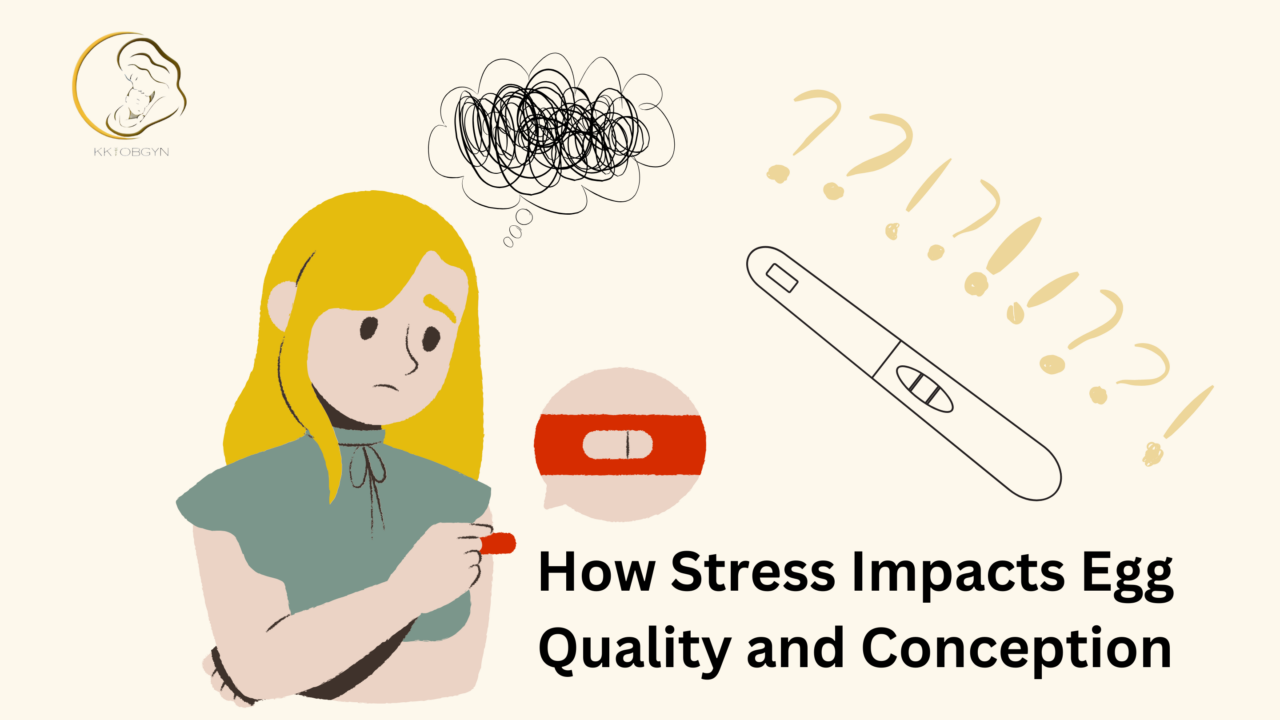Stress has become a common part of modern life, but its effects on fertility are often overlooked. While stress alone may not directly cause infertility, research suggests that chronic stress can negatively impact egg quality, ovulation, and overall reproductive health.
In this article, we’ll explore the science behind how stress affects egg quality and conception, the role of stress hormones, and ways to manage stress for better fertility outcomes.
The Link Between Stress and Fertility
The female reproductive system is a delicate balance of hormones that regulate ovulation, egg maturation, and implantation. When a woman experiences chronic stress, her body prioritizes survival over reproduction, leading to hormonal imbalances that can disrupt fertility.
|
Aspect of Fertility Affected |
How Stress Impacts It |
|
Egg Quality |
Increased oxidative stress damages eggs, reducing their viability. |
|
Ovulation |
High stress can delay or even prevent ovulation. |
|
Implantation |
Chronic stress reduces blood flow to the uterus, affecting embryo implantation. |
|
Hormonal Balance |
Increased cortisol disrupts estrogen and progesterone levels. |
|
Menstrual Cycle |
Stress can cause irregular or missed periods. |
How Stress Affects Egg Quality
Egg quality refers to how healthy and genetically normal an egg is. Poor egg quality can lead to difficulties in conception, a higher risk of miscarriage, and chromosomal abnormalities in embryos.
1. Oxidative Stress and Egg Damage
Oxidative stress occurs when there’s an imbalance between free radicals (harmful molecules) and antioxidants in the body. High stress levels contribute to oxidative stress, which damages the DNA inside eggs, leading to:
- Poor fertilization rates
- Increased risk of miscarriage
- Embryo implantation failure
|
Factor |
Effect on Eggs |
|
Chronic stress |
Increases free radicals, causing DNA damage in eggs. |
|
Poor lifestyle habits |
Stress often leads to poor diet and lack of exercise, which further damages eggs. |
|
Inflammation |
Stress increases inflammation, affecting egg maturation. |
2. Hormonal Imbalances and Egg Development
Stress triggers the release of cortisol and adrenaline, which interfere with reproductive hormones like:
|
Hormone |
Effect of Stress |
|
Gonadotropin-releasing hormone (GnRH) |
Suppressed by stress, leading to irregular ovulation. |
|
Luteinizing hormone (LH) & Follicle-stimulating hormone (FSH) |
Disrupted balance prevents proper egg maturation. |
|
Estrogen & Progesterone |
Imbalances can cause poor egg quality and thin uterine lining. |
Can Stress Cause Anovulation?
Yes! Stress can interfere with ovulation, causing anovulation (lack of ovulation), which prevents pregnancy.
How Stress Delays or Prevents Ovulation
- Hypothalamic Suppression – The brain’s hypothalamus regulates ovulation. High stress levels suppress its function, leading to skipped or delayed ovulation.
- Increased Prolactin Levels – Stress raises prolactin, a hormone that can inhibit ovulation (common in women with irregular cycles).
- Disrupted LH Surge – The LH surge is necessary for egg release. Chronic stress disrupts this surge, preventing ovulation.
|
Type of Stress |
Effect on Ovulation |
|
Acute Stress (short-term) |
May delay ovulation but won’t completely stop it. |
|
Chronic Stress (long-term) |
Can suppress ovulation altogether. |
The Role of Cortisol in Fertility
Cortisol is the body’s primary stress hormone. While it’s essential for managing short-term stress, chronic high cortisol levels negatively impact fertility.
Effects of High Cortisol on Reproduction
- Reduces blood flow to reproductive organs, affecting egg maturation.
- Increases insulin resistance, which can lead to polycystic ovary syndrome (PCOS), a leading cause of infertility.
- Disrupts thyroid function, leading to hormonal imbalances that can impair fertility.
- Lowers libido and sexual function, making conception less likely.
|
Cortisol Level |
Impact on Fertility |
|
Normal |
Supports body function and fertility. |
|
Elevated |
Disrupts ovulation, reduces egg quality, and increases miscarriage risk. |
Can Stress Cause Miscarriage?
Research suggests that extreme stress during early pregnancy may increase the risk of miscarriage. The reasons include:
- Increased uterine contractions, leading to early pregnancy loss.
- Poor embryo implantation, due to reduced blood supply to the uterus.
- Weakened immune response, increasing the risk of inflammation-related pregnancy complications.
Stress and Early Pregnancy Loss: Key Findings
- Women with high stress levels are more likely to experience first-trimester miscarriages.
- High cortisol levels interfere with progesterone, which is essential for maintaining pregnancy.
- Severe emotional distress can trigger autoimmune responses, leading to pregnancy loss.
How to Reduce Stress for Better Egg Quality and Conception
While eliminating stress completely isn’t realistic, managing it effectively can improve fertility outcomes. Here are some science-backed ways to reduce stress and support fertility:
1. Mindfulness & Meditation
Practicing mindfulness reduces cortisol levels and improves emotional well-being.
|
Mindfulness Activity |
Effect on Fertility |
|
Meditation |
Lowers stress hormones and improves hormone balance. |
|
Deep breathing |
Reduces anxiety and improves blood flow to reproductive organs. |
|
Yoga |
Lowers inflammation and regulates menstrual cycles. |
2. Exercise (But Not Too Much!)
Moderate exercise improves fertility, but excessive workouts can increase stress and disrupt ovulation.
|
Exercise Type |
Effect on Fertility |
|
Light to moderate (walking, yoga, Pilates) |
Supports egg health and ovulation. |
|
High-intensity (marathon training, heavy cardio) |
Can suppress ovulation by increasing cortisol. |
3. Diet for Egg Health
Eating an antioxidant-rich diet can reverse oxidative stress and protect egg quality.
|
Nutrient |
Food Sources |
Benefit |
|
Antioxidants |
Berries, dark chocolate, spinach |
Protects eggs from damage. |
|
Omega-3s |
Salmon, chia seeds, walnuts |
Reduces inflammation, improves egg health. |
|
Vitamin D |
Sunlight, eggs, dairy |
Supports ovulation and hormone balance. |
4. Sleep and Rest
Lack of sleep increases cortisol and disrupts reproductive hormones. Aim for 7-9 hours of quality sleep to optimize fertility.
|
Sleep Habit |
Effect on Fertility |
|
Going to bed early |
Supports hormone regulation. |
|
Reducing screen time |
Lowers cortisol before sleep. |
|
Avoiding caffeine at night |
Prevents hormone disruption. |
Final Thoughts
Stress is an often-overlooked factor in fertility. While it does not directly cause infertility, chronic stress can negatively affect egg quality, ovulation, and implantation. The good news is that reducing stress through mindfulness, exercise, proper nutrition, and sleep can significantly improve reproductive health.
If you’re trying to conceive, prioritizing mental and emotional well-being can make a significant difference in your fertility journey.


